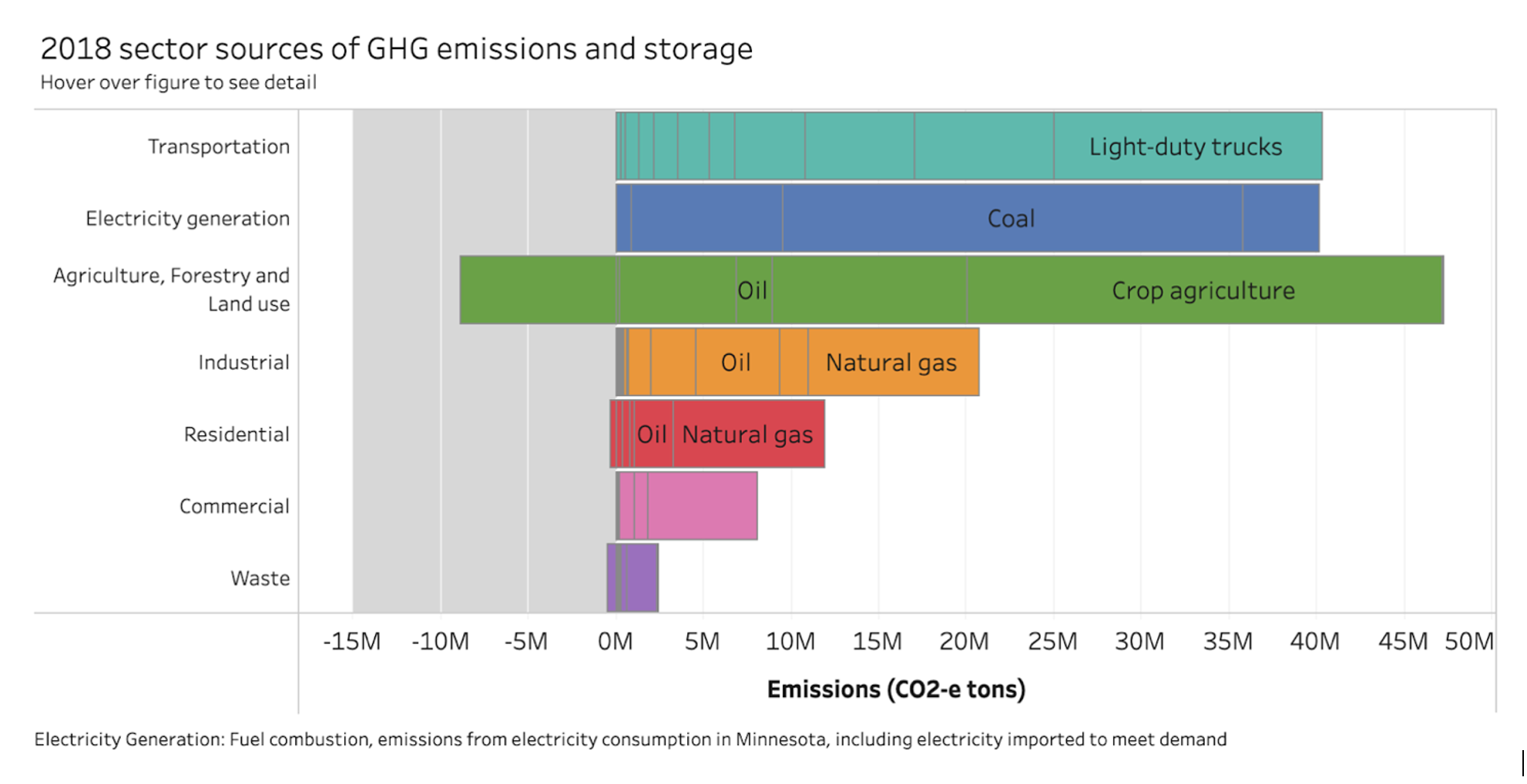Our position on a proposed MN clean fuel standard
The principles we outlined below will keep any clean fuel standard true to its name. (Photo: Minnesota DOT, CC BY-NC 2.0)
In late 2021, the Walz administration announced a new initiative to explore a so-called "clean fuel standard" for Minnesota.
While a clean fuel standard may hold promise for reducing transportation sector greenhouse gas emissions, it also poses potential risks to our state's water quality, habitat, pollinators and public health by incentivizing further conversion of natural areas to row-crop acreage for the production of corn ethanol (which already consumes 40% of Minnesota's corn crop).
 In curbing greenhouse gas emissions from transportation, we have to make sure we don't increase emissions and other environmental problems in the agricultural sector. (Image: MPCA)
In curbing greenhouse gas emissions from transportation, we have to make sure we don't increase emissions and other environmental problems in the agricultural sector. (Image: MPCA)
With that in mind, FMR was one of 22 organizations that delivered a letter on January 5 to the Walz administration detailing our position on the state's proposed clean fuel standard rulemaking process.
Here's the full letter (graphics excluded).
----------------------
RE: MN Clean Fuels Standard Principles
January 5, 2022
To: Tim Sexton, MN Department of Transportation
To: Andrea Vaubel, MN Department of Agriculture
On behalf of the undersigned organizations, I would like to thank you for your efforts to solicit stakeholder perspectives and principles regarding a potential path forward for a Clean Fuels Standard (CFS) in Minnesota.
At the outset, we would like to acknowledge the interdependence of rural communities and the corn-based ethanol economy. We strongly feel that new resources and policy solutions need to be focused, not on furthering that reliance, but on helping rural communities move into regenerative agriculture systems that support family farms. These systems could include other biofuels and renewable energy.
While a CFS may hold promise for reducing transportation sector greenhouse gas (GHG) emissions, a CFS also poses potential risks to our state’s water quality, habitat, pollinators, and public health. With that in mind, we strongly encourage the state to fully incorporate each of the following principles into any CFS proposal before deciding whether there is a path forward for a CFS in Minnesota.
Minnesota’s GHG emissions portfolio
As you know, while transportation emissions are the #1 GHG emissions source in Minnesota, agriculture is a close second. Unlike transportation and energy generation, agricultural sector emissions are increasing. We cannot afford to pursue transportation GHG reductions in a way
We also face some severe and pervasive water quality and public health challenges associated with our overreliance on annual row-crop systems.
Ethanol won’t put us on track to meet goals
We are concerned that a CFS that incentivizes corn-based ethanol will result in the following likely outcomes:
- Minnesota may make some short-term reductions in our transportation sector greenhouse gas emissions, but these reductions will be well below the reductions required to meet our mid- and long-term climate goals in that sector.
- Minnesota won’t achieve our clean water quality goals: Despite the best efforts of farm operators, annual row-crop systems (like corn and soybeans) are naturally prone to runoff pollution and groundwater contamination.
- Minnesota won’t achieve our habitat and pollinator goals: Policies that further intensify agricultural land use, grassland conversion and pesticide application are largely incompatible with achieving our state’s habitat and pollinator goals.
- Increased conversion of natural lands to croplands may prevent Minnesota from achieving our agricultural greenhouse gas emissions reduction goals.
- Investment, time and attention that would have been spent on electrification of transportation, transit improvements and further diversification of cropping systems will have been diverted to further expand corn-based ethanol, a product that can’t take us to our ultimate goals.
Our main principle: put the ‘clean’ in a clean fuels standard
It may be possible for a CFS to provide meaningful transportation sector GHG emissions reductions in a way that is compatible with our other environmental goals. To do so, we respectfully request that the following principles are fully incorporated into any CFS rule-making process.
Environmental performance principles:
- Set a science-based emissions reduction goal: A 45% reduction economy-wide by 2030 and a 100% reduction economy-wide by 2050 are the internationally accepted GHG reduction benchmarks. A CFS must align with, and be one part of, a comprehensive and science-based GHG reduction plan in the transportation sector that aligns with internationally accepted goals. This should include expanding transit and other mobility options for Minnesotans, other policies to reduce vehicle miles traveled (VMT) and switching to electric vehicles (EVs) statewide through investments in EV purchase rebates, public charging infrastructure and converting publicly-owned vehicle fleets.
- Define "clean" to include air, water and habitat: Any CFS must include metrics for clean water, healthy habitat and clean air into the definition of clean. The state should explore innovative mechanisms to support and prioritize pathways that provide co-benefits for habitat, pollinators and air quality in a CFS, and ensure that the CFS outcomes are compatible with the state’s existing nutrient reduction strategy goal of 45% by 2040 in the Mississippi River watershed.
- Embrace winter-hardy oilseeds: There is strong potential for including winter annual oilseeds for biodiesel, renewable diesel, and aviation biofuels in a CFS. We encourage the state to focus on these categories because these will likely be the most difficult aspects of transportation to electrify. The use of winter annuals as a biofuel feedstock in rotation on existing cropland has significant co-benefits for water quality, wildlife and pollinators.
- Protect conservation & forested lands: A recent report estimates that Minnesota converted approximately 2 million acres of grasslands to row-crop production between 2012 and 2019. Multiple studies (including researchers at the University of Wisconsin Gibbs Land Use and Environment Lab) suggest that land conversion is accelerated by increased biofuel production. The Clean Fuel Standard should avoid row crop conversion from grasslands and forests. Indirect land-use change must be accounted for when assigning cropland carbon intensity (CI) scores in a way that ensures recently converted lands are not eligible for favorable CI scoring through a CFS.
- Invest in equitable electrification: Credit revenue derived from electrification should be invested in expanding access to the lowest-CI technologies, including electrification infrastructure in underserved and economically disadvantaged communities and BIPOC communities.
- Evolve over time: A CFS should include a mechanism for assigning CI scores for new feedstocks over time.
- Avoid increasing extraction or use of fossil fuels: The CFS must not incentivize or facilitate enhanced oil recovery which enables oil producers to expand oil production and produce even more carbon emissions.
- Include realistic cropland emissions assumptions: All upstream and on-farm emissions of bio-based feedstock production must be accurately accounted for in the CI scoring process. The CI scoring approach must include realistic cropland ag carbon sequestration assumptions that are verifiable, additional and permanent. No-till and cover crop strategies do not reliably result in permanent carbon sequestration. Failure to address this invites a worst-case scenario where fossil fuel companies buy phantom carbon credits from the ag/ethanol industry instead of reducing their own emissions.
Process & scientific principles:
-
Inclusive, not profit-driven: The development of a CFS must not be an agency & industry- dominated process similar to the Governor's Council on Biofuels. Environmental quality and public health advocates must have no less than equal representation in this process moving forward.
-
Transparent: This process must include a transparent, independent process for CI and habitat scoring and require clear statements of conflicts of interest and economic disclosure statements for those engaged in the advisory process auditing the CI scoring process.
-
Equitable: Our agricultural & transportation systems often result in environmental, economic and racial injustice and inequity. A CFS should aim to meaningfully address priority economic and racial inequities embedded in our existing agriculture and transportation sectors. For instance, replacing greenhouse gas emissions through electrification of buses does more to improve the health of communities disproportionately impacted by air pollution than the adoption of biodiesel buses.
-
Affordable: The Minnesota Department of Agriculture’s own report estimates the costs of bringing fueling sites up to E15 compatibility is between $771 million to $784 million and would take approximately 10 years. This is a massive cost that must not fall on the shoulders of state and local taxpayers or utility ratepayers, and must instead be paid for entirely by those business interests.
-
Technology neutral: “Technology neutral” does not mean “technology equal.” Some technologies are superior to others, particularly when environmental externalities are considered. For instance, corn-based ethanol may have a lower carbon intensity than pure gasoline but is outperformed by vehicle electrification when it comes to emissions reduction, air pollution or water degradation. A process that insists on technology neutrality without acknowledging that different technologies produce different environmental externalities is problematic.
Agency Co-leadership
Agencies leading this process must themselves be ‘technology-neutral.’ While we appreciate the leadership of staff from the Minnesota Department of Agriculture (MDA) in this effort, we have not previously supported a CFS rulemaking process led by the MDA in part because of their agency mission to promote agricultural products which has resulted in a clearly established preference for expanding our reliance on corn ethanol. We would be more likely to support a CFS rule-making process that includes either the Minnesota Pollution Control Agency or the Department of Commerce in addition to MNDOT and the MDA.
Additional concerns
- A CFS might incentivize carbon capture, utilization and storage (CCUS) at ethanol facilities, inviting pipeline construction and fossil fuel extraction that poses additional environmental risks. A CFS must not directly or indirectly provide support for CCUS at ethanol plants.
- A CFS could incentivize liquified natural gas (LNG) from the largest feedlots. While LNG re- use on-farm (for machinery, buildings and facilities), and large industrial users like ethanol plants, foundries and cement production is appropriate, a CFS that includes LNG in a way that promotes new or expanded large feedlots is not compatible with a clean future.
Thank you for taking the time to review these CFS principles and additional concerns. We are happy to discuss these items in further detail at your convenience.
Sincerely,
Steve Morse - Minnesota Environmental Partnership
Citizens Climate Lobby Minnesota
Clean Up the River Environment
Clean Water Action Minnesota
COPAL
Environmental Working Group
Friends of Minnesota Scientific and Natural Areas
Friends of the Mississippi River
Hastings Environmental Protectors
Honor the Earth
Izaak Walton League Minnesota Division
League of Women Voters Minnesota
League of Women Voters Upper Mississippi River Region
Minnesota Interfaith Power and Light
Minnesota Ornithologists Union
Minnesota River Valley Audubon Chapter
Minnesota Well Owners Organization
MN350
Move Minnesota
Pollinator Friendly Alliance
Sierra Club - North Star Chapter
Vote Climate
Cc: Governor Tim Walz
Lt. Governor Peggy Flanagan
Commissioner Katrina Kessler, Minnesota Pollution Control Agency
Commissioner Margaret Anderson Kelliher, Minnesota Department of Transportation Commissioner Thom Petersen, Minnesota Department of Agriculture
____________________
